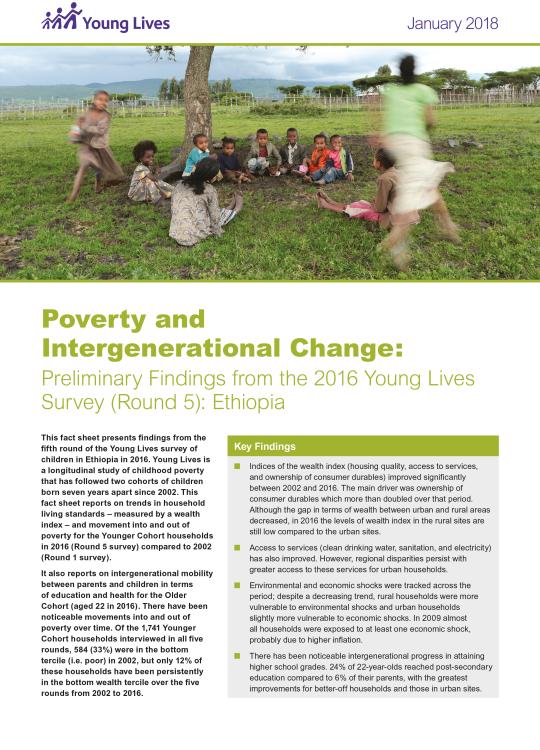
Breadcrumb
Poverty and Intergenerational Change: Preliminary Findings from the Round 5 Survey in Ethiopia
Round 5 Longitudinal Poverty and Intergenerational Change Fact Sheet
This fact sheet presents findings from the fifth round of the Young Lives survey of children in Ethiopia in 2016. Young Lives is a longitudinal study of childhood poverty that has followed two cohorts of children born seven years apart since 2002. This fact sheet reports on trends in household living standards – measured by a wealth index – and movement into and out of poverty for the Younger Cohort households in 2016 (Round 5 survey) compared to 2002 (Round 1 survey). It also reports on intergenerational mobility between parents and children in terms of education and health for the Older Cohort (aged 22 in 2016). There have been noticeable movements into and out of poverty over time. Of the 1,741 Younger Cohort households interviewed in all five rounds, 584 (33%) were in the bottom tercile (i.e. poor) in 2002, but only 12% of these households have been persistently in the bottom wealth tercile over the five rounds from 2002 to 2016.
Key Findings:
Indices of the wealth index (housing quality, access to services, and ownership of consumer durables) improved significantly between 2002 and 2016. The main driver was ownership of consumer durables which more than doubled over that period. Although the gap in terms of wealth between urban and rural areas decreased, in 2016 the levels of wealth index in the rural sites are still low compared to the urban sites.
Access to services (clean drinking water, sanitation, and electricity) has also improved. However, regional disparities persist with greater access to these services for urban households.
Environmental and economic shocks were tracked across the period; despite a decreasing trend, rural households were more vulnerable to environmental shocks and urban households slightly more vulnerable to economic shocks. In 2009 almost all households were exposed to at least one economic shock, probably due to higher inflation.
There has been noticeable intergenerational progress in attaining higher school grades. 24% of 22-year-olds reached post-secondary education compared to 6% of their parents, with the greatest improvements for better-off households and those in urban sites.

